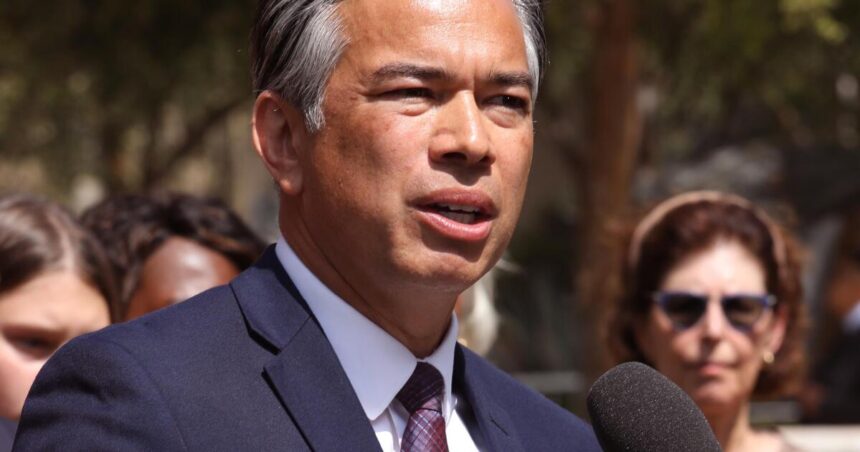
California Atty. General Rob Bonta has begun to pressure the political leaders of Los Angeles to sign a legal agreement that will force them to draw new boundaries for the city’s 15 council districts – a dramatic step that could set off a shock wave in City Hall.
A draft legal document prepared by Bonta’s office, a copy of which was seen by The Times, would require the city to finalize a new council district map in time for the 2026 primary election. Council members would be barred from considering their own political fortunes when approving the map, the confidential document said.
The documents do not indicate whether elected city officials have agreed to Bonta’s request — or whether they plan to back down. It also did not say whether Bonta’s office found any violations of the law or other wrongdoing during the city’s 2021 redistricting process.
However, two sources familiar with the discussions said Bonta’s legal team has expressed concern in recent weeks that the current City Council-approved map in 2021 does not provide enough representation for Latinos in parts of the city.
Bonta’s office singled out two council districts on the Eastside — one represented by Eunisses Hernandez, the other by Kevin de León — as areas of concern, saying the district doesn’t have enough Latino voters to ensure Latinos have a chance to vote. the chosen candidate, according to the source, who declined to be named because they are not authorized to speak publicly.
In briefings with council members, lawyers for the city said Bonta’s team has also discussed the possibility of creating a third “Latino” district in the San Fernando Valley – one with a significant concentration of Latino voters, two sources said. The idea was proposed by the city’s redistricting commission in 2021 but was shot down by the council.
Bonta has been investigating the City Council’s controversial redistricting process for nearly two years. He announced the investigation following a scandal over secretly recorded conversations about the proposed map.
Council President Marqueece Harris-Dawson declined to discuss Bonta’s request, which was the subject of a lengthy closed session at council last week. He referred questions to Atty. Hydee Feldstein Soto, whose office declined to comment.
Joanne Adams, deputy director of communications for Bonta’s office, also declined to comment, saying only that the attorney general’s investigation into the LA 2021 redistricting process “remains ongoing.”
The draft document, titled “(Proposed) Stipulated Judgment,” did not say when negotiations with the city would begin or when they would end. Several council members declined to comment, saying they are prohibited from discussing legal matters that are being dealt with in closed session.
The document calls for the city to prepare a new map that complies with the federal Voting Rights Act and the state Fair Map Act, which requires district boundaries to be drawn to ensure that underrepresented groups, such as Black and Latino voters, have the ability to vote. selected candidate.
Any stipulated judgment must be signed by both parties and approved by a High Court judge.
Talks between Bonta and the city come at a striking moment. Candidates in the November 5 election have conducted fierce campaigns to represent the three council districts, whose boundaries were approved in 2021 and have been considered final. Voters will also decide next month whether to create an independent redistricting process in LA – in which the council is not involved – which will begin in 2031.
Redrawing council district boundaries in 2026 also has the potential to collide with the city’s new charter reform commission, which is being formed and is expected to look into next year to expand the size of the City Council.
Redistricting usually only occurs at the beginning of each decade, following the release of US census data. In LA so far, the City Council has had the final say on maps. The process has been heavily politicized, with neighborhood, advocacy and civil rights groups, as well as council members, pushing for boundaries they believe will be best for themselves or their constituents.
The request from Bonta’s office could prompt new questions about whether the council can do more to increase Latino voting power in 2021, when the map is approved. Although Latinos make up nearly half the city’s population, only one-third of the council seats — five of 15 — are held by Latinos.
Newsletter
Get the lowdown on LA politics
Sign up for the LA City Hall newsletter to get weekly insights, scoops and analysis.
You may occasionally receive promotional content from the Los Angeles Times.
The new redistricting process could also force the council to go back to the dreaded period.
In 2022, the public heard secretly recorded audio featuring three councilors – De León, Nury Martinez and Gil Cedillo – discussing redistricting with high-level labor leaders. The conversation, which took place in 2021, featured violent and racist comments as well as comments about Latino political influence, or lack thereof. The participants also discussed how to process the district council map that is being prepared by the citizens’ redistribution commission.
After the scandal, activists packed the boardroom, accusing the three board members of working to undermine the power of Black voters. Martinez quickly retreated. Cedillo served out the rest of his term, having lost again.
De León apologized for what he said and didn’t say during the conversation. But he denied trying to reduce Black voting power, noting that the council left three districts with Black representation virtually unchanged in 2021 redistricting.
Neither De León nor Hernandez would comment on Bonta’s investigation or the notion that there are problems with Latino representation in their districts.
Bonta announced his investigation days after the audio leak, saying the redistricting process is “fundamental to our democracy and the ability of communities to be heard.”
The leaked audio, he said at the time, cast doubt on the process.
“We will work on the facts to restore confidence in the process for our citizens,” said Bonta.
The 2021 redistricting process was particularly contentious, with some council members at odds with the 21-member citizen commission. The commission recommends major changes to district boundaries in or near the San Fernando Valley.
During deliberations, the commission called for the creation of a council district with a majority Latino population in the west Valley. About 40% of the eligible voting population will be Latino, which could increase the prospects for Latino council members in the coming years.
The proposal calls for major changes in the district represented by Martinez and three other council members — Paul Krekorian, Nithya Raman and Bob Blumenfield. At one point, Raman and Krekorian faced the possibility of losing the entire district.
In the end, the City Council rejected many of the proposed changes for the Valley, bringing the final district map closer to the original.
This is not the only time the city has faced outside scrutiny over redistricting and Latino representation. In 1985, the federal Department of Justice sued the city, accusing council members of undermining the political influence of Latino voters in a map approved a few years earlier.
The lawsuit alleges that the city’s 1982 redistricting process dispersed Latino residents living in or near the city center into several council districts. It also said the map was drawn in a way that undermined Latino voting power in the northern Valley.
The council settled the case by creating a new district near the city — one with a high concentration of Latinos. He also made major changes along the lines of the San Fernando Valley, increasing the number of Latinos in the district that includes Sylmar and Pacoima.
Although the document produced by Bonta’s office does not say whether investigators have found any specific wrongdoing, it does highlight other issues.
The document calls for council members, staff and all other city employees to undergo training courses on the state Ralph M. Brown Act and the California Public Records Act, which are designed to ensure transparency and open government.
The city must also establish new safeguards regarding communications and records by employees. City officials should enact a policy prohibiting the use of “personal accounts” to conduct city business.




